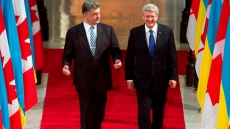OTTAWA — Stephen Harper, Canada's 22nd prime minister, officially left political life Friday by resigning his seat in the House of Commons.
Here are five ways he's changed politics in Canada:
1. Prime ministers take away less. Harper presided over a change in 2012 that substantially slashed his own pension. For one thing, he must wait until he's 67, unlike prior PMs who started collecting at 65.
For another, he'll now only get three per cent of his salary per year of service, when previous PMs pocketed two-thirds. So, between age 67 and 90, he'll make about $1.6 million, as opposed to the $4 million he would have collected under the old system, according to the Canadian Taxpayers Federation. That's on top of his MP pension.

2. They reach past the mainstream media more. That Harper chose social media to send his farewell message befits a trend he began while in power of centralizing government communications and communicating directly with voters through websites, emails and the like, as opposed to traditional methods of press releases, interviews and news conferences. Current Prime Minister Justin Trudeau has already become notorious for his use of direct-to-the-public photographs to shape his image.

3. No more big money. One of the first changes Harper made as prime minister was the Accountability Act of 2006, which, among other things placed limits on political donations; he would later go on to eliminate the per-vote-subsidy to political parties.
Harper also used campaign spending rules to benefit his party. One of the reasons he called such a long election campaign last year was because of a rule change he brought in lifting the cap on election expenses — giving an advantage to the party with the largest war chest, in this case the Conservatives.

4. Partisan punches. The tone of debate in the House of Commons under the Conservatives often took a decidedly partisan turn.
Among other things, what little speaking time MPs have to talk about their constituencies has become a forum for partisan poking; answers from the government in question period are often little more than talking points. Harper's former parliamentary secretary once infamously answered a question about Canada's mission in Iraq by quizzing the NDP on statements about Israel.

5. The right, united. Harper has seen Canadian conservative politics through its modern iteration — as a staffer for a Progressive Conservative MP, as a Reform MP and as leader of the Canadian Alliance before going on to unite that party with the PCs and becoming the leader of the new Conservative Party in 2004.
Whether those factions can remain united will be tested by the election of a new party leader next year.





